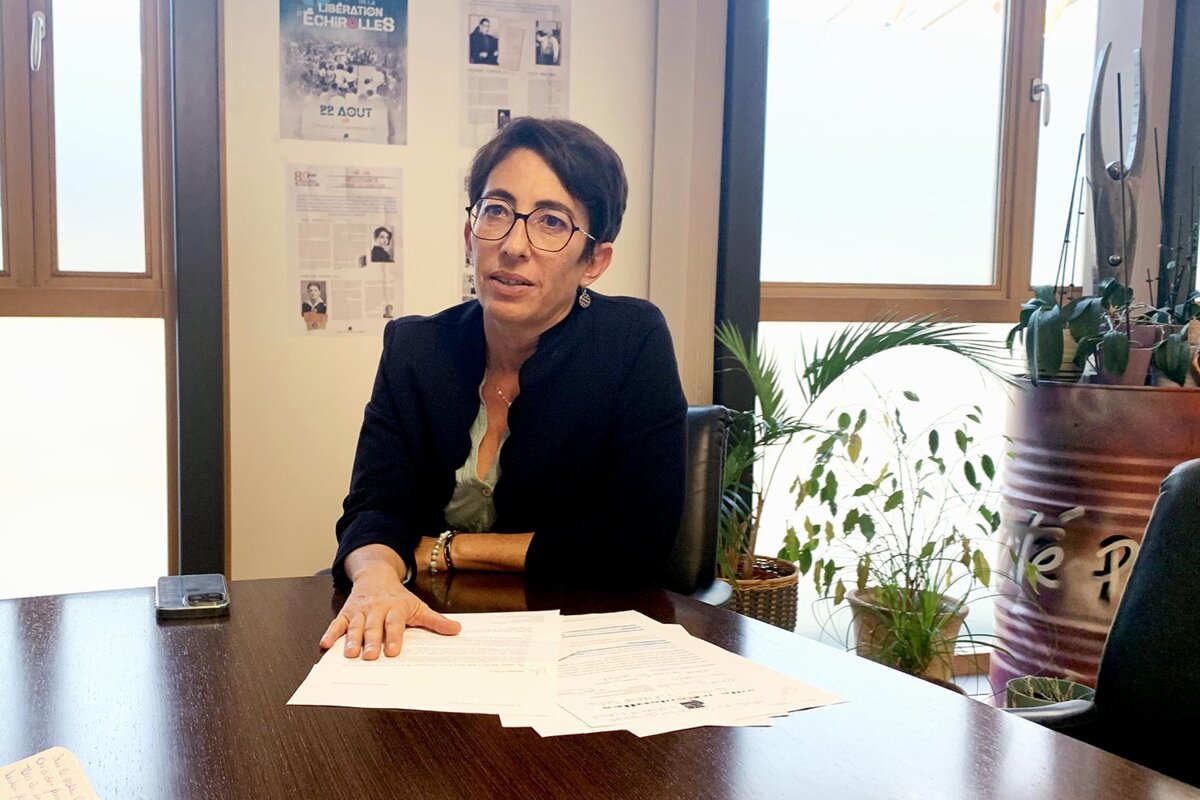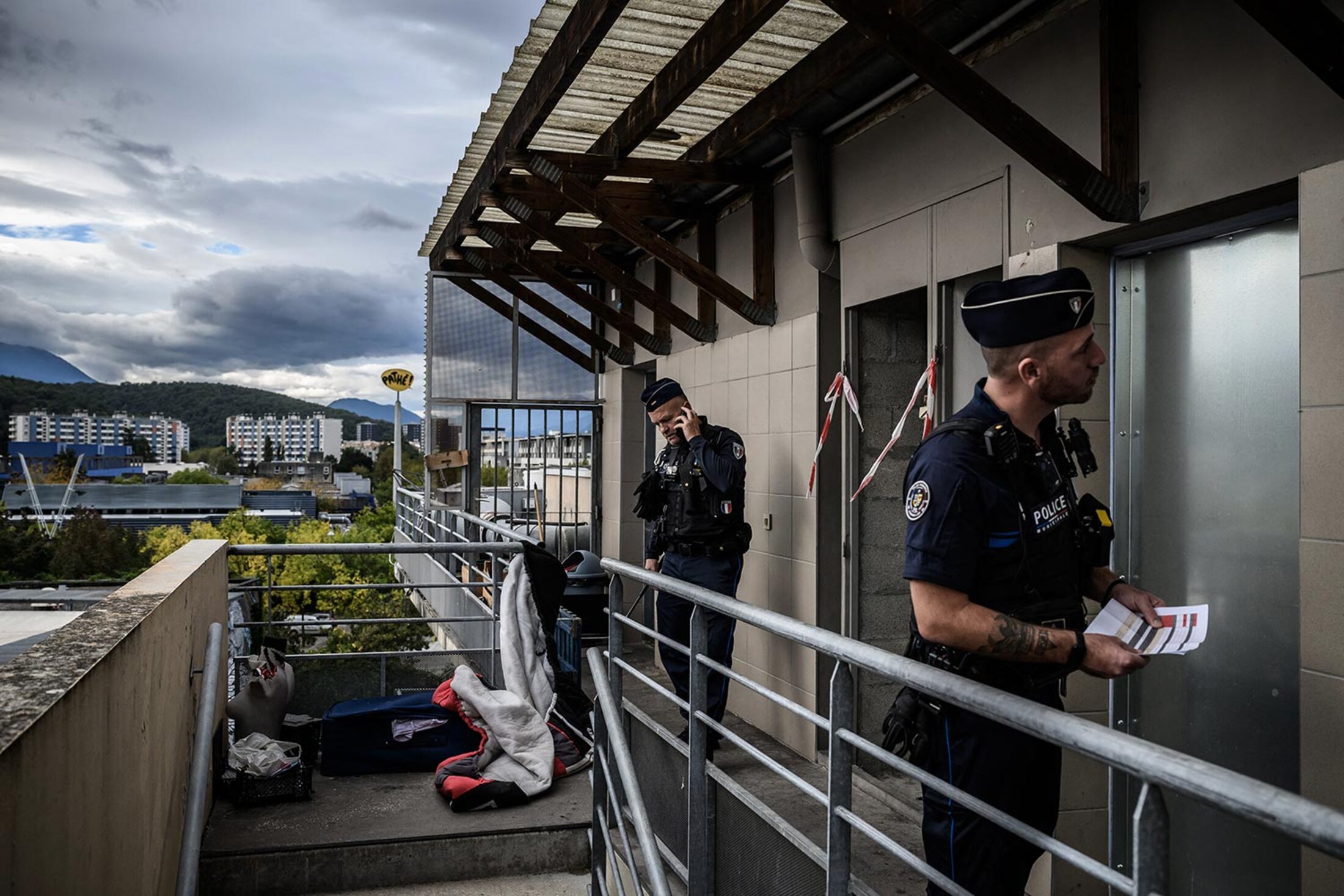The residents of Échirolles, a suburb of Grenoble in south-east France, are no strangers to the problems of drug trafficking. But the events they experienced last summer were even tougher to bear than usual. The number of drug-related shootings increased, largely around a well-known dealing hotspot, the Le Carrare building in the town centre. At least two people were injured in the shootings.
In a bid to tackle the issue, communist mayor Amandine Demore - who took over from Renzo Sulli when the latter resigned in 2023 – sent a list of her concerns and demands directly to the president at the end of August. Her main request? The establishment of a fully-operational police station in the heart of the town, a move which would increase the number of police officers available twenty-four hours a day. For twenty years this regular request has been turned down by successive interior ministers.
When Mediapart visited the mayor on October 11th the response from the head of state had just arrived by letter. In his reply – which Mediapart has seen in full – Emmanuel Macron said that the mayor’s request did “not appear to offer a pertinent solution given the Grenoble area's geographical layout”.

Enlargement : Illustration 1

However, the president did announce the deployment of an additional twenty-eight police officers for the Grenoble area, starting in November. This response has not convinced the mayor, however. “I don’t see anything very concrete in the president’s reply,” Amandine Demore said, but she does not plan to give up asking for help. “I’m going to get back to him and, if necessary, I will mobilise the residents, who are the main victims of this situation,” she said.
In fact, the police presence in Échirolles has already been stepped up in recent months, particularly around the Le Carrare area. Police vehicles patrol the area all day. It was at the Le Carrare block of flats that two shootings took place in August, which left at least two people injured.
This strategic drug trafficking hub in Échirolles, located near the town hall and the current national and municipal police stations, is said to be one of the most lucrative dealing points in the Grenoble area. Its turnover is estimated to be between 10,000 euros and 15,000 euros per day, according to Grenoble public prosecutor Éric Vaillant.
A rundown residential building at the heart of trafficking
The situation at this building has deteriorated significantly over many years. “The dealers started to move in just before Covid,” noted a nearby shopkeeper. However, she is quick to add that “everything is fine” when asked about the situation in Échirolles over the past few months. “Perhaps we’re downplaying it because we’re here every day and nothing has ever happened to us, but the situation perhaps isn't normal,” she explained.
Originally, Le Carrare was simply a private residential block, made up of eighty studios or small flats, ideal for students attending the nearby journalism school. However, the apartments were taken over by drug dealers, with some of them vandalised after being occupied or sublet by rogue landlords.

Enlargement : Illustration 2

In response to this downward spiral, the mayor of Échirolles issued two decrees, in May and July, ordering the property owners to carry out renovation work on the building for safety reasons. “Electrical boxes had been ripped open, there was rubbish everywhere, and some of the apartments were being used as toilets,” said the mayor, who visited the building several times to witness the damage for herself.
However, the work required by the town of Échirolles could not be carried out, as the owners informed the council they were “unable financially” to undertake the renovations. It was also difficult for tradespeople to work due to the presence of drug dealers.
It could have been catastrophic; for example, fire safety was no longer guaranteed.
The city then decided to take things a step further. After the issue of a council decree, all the building's remaining residents were evacuated from their homes on September 24th for a minimum of three weeks.
This unusual course of action was a painful one for the residents. “Action was needed, and now we must care for these residents, who are the main victims of the drug trafficking that has exacerbated the building’s deterioration,” explained the mayor Amandine Demore. Around twenty tenants were still living in the building, all of whom have been helped by the council and are being temporarily rehoused in hotels before being found permanent accommodation.
The evacuation was justified on the grounds of the risks faced by the remaining tenants. “...[I]t could have been catastrophic; for example, fire safety was no longer guaranteed,” explained the mayor. According to France 3 television, in a later press conference on October 15th she announced that the closure of the Le Carrare building would be extended.
'It's like being in Texas'
The decision to clear the building has the support in particular of Grenoble's public prosecutor, Éric Vaillant, who described it as “courageous”. He said: “Some may have considered it as the state capitulating.” In fact, his view is that it was quite the opposite; and that evacuation was the right solution. “We’re depriving the traffickers of several safe houses, as they were using the flats to store goods, weapons, or to rest their crews,” said Éric Vaillant.
The change in the situation even seems to have convinced the nearby journalism school not to move, an option the university had considered after the events of last summer.
However, the trafficking has not gone away, as mayor Amandine Demore herself acknowledges. On October 12th, right in front of Mediapart's eyes, the police stopped and searched two young men near Le Carrare. The officers combed through the parking area, hoping to find something to incriminate the pair. They came up empty-handed and decided to allow the youths call their parents. In the meantime, one of the officers appeared to take the opportunity to give one of them a stern talking-to before leaving the scene.
The mother of one of the boys arrived a few minutes later and immediately shouted “Where do you think you're going?” at one of them, as he headed back towards the dealing spot. Her outburst made no difference. The young man was soon back at the same place he had been a few minutes earlier, standing ramrod straight, watching every passer-by.
“It's like being in Texas here,” remarked one local resident whom Mediapart met at Place des Cinq-Fontaines near Le Carrare. She recalled the scooter incident that took place on October 9th when a young man allegedly sped towards municipal police officers, knocking one of them over. A court verdict on whether it was an intentional act or not is due on November 7th.
'We need to focus on prevention'
Amandine Demore has not limited her demands to the president just to a fully-operational police station in the town. The mayor is also calling for the return of community police officers, who used to have a permanent presence on the ground, gathering information and resolving issues. She believes the response cannot solely be repressive. “We need to focus on prevention to stop young people from falling into drug trafficking so easily,” she insists.
This is the mission that youth workers in the commune strive to fulfil every day, working closely with young people, despite ever-dwindling resources. “We haven’t got a penny left. We’re now expected to do a lot of admin work, but we also need to be out on the ground – it’s impossible,” explains Alexandre, a youth worker in Échirolles who works with young people affected by these issues.
“My fellow youth workers can’t even set foot in Le Carrare, so they can’t do their support work there,” he adds. However, he does not believe that a purely repressive approach is the solution. The first to bear the brunt of such an approach are the “increasingly younger kids who spend their time standing outside buildings as lookouts”.
As is the case in Marseille, Grenoble's public prosecutor Éric Vaillant is well aware of the lower age profile of those involved at dealer hotspots and says he has decided to take action accordingly - although success is not always guaranteed. “When the police stop young people, they first take their details and then summon the parents. For some families, it’s the first they’ve heard of it, and it gives them a chance to rein in a child who’s going down the wrong path,” said the prosecutor.
An explosion in poverty levels
These young people are an easier target for the drug networks to recruit and manipulate than others, because “all you need to do is promise them 100 euros a day,” explained Éric Vaillant. This is a real temptation, particularly as Échirolles is facing an explosion in poverty levels. “It's getting worse and worse; all the indicators are deteriorating,” confirmed the mayor.
In 2021 – the latest year for which figures are available - the poverty rate reached 24% of the local population. The unemployment rate is also particularly high - 16.4% in 2021, while nationally it stood at 7.4% for the working population aged 15 to 64, according to the state statistical agency INSEE. On top of this, the town has three neighbourhoods designated as 'priority areas' for urban policy (QPVs in the French acronym), and two of its three middle schools are in an education priority zone.
The national anti-poverty charity Secours Populaire, which has a local branch located in the heart of Échirolles's neighbourhoods, has also noticed an increase in levels of vulnerability among the area's residents. “We’re seeing more and more people. One hundred and fifty people now come to collect food parcels,” said a local employee of the charity.
The association is doing its best to meet this ever-increasing demand, but its resources are just unable to keep pace. “We rotate stock so that everyone gets some products, but sometimes we simply have nothing left to give,” the charity worker explained.
Being close to the Carrare building has real consequences. “It's tough because they're busy with their deals. We don’t interfere, but fewer and fewer volunteers are signing up because we're in a difficult neighbourhood,” said the charity worker. There was even a break-in at the Secours Populaire's premises last Christmas Eve, which temporarily deprived the organisation of the resources to help local people.
-----------------------------------------------------------------------------
- The original French version of this article can be found here.
English version by Michael Streeter


